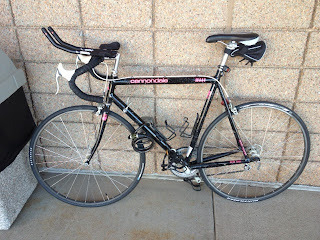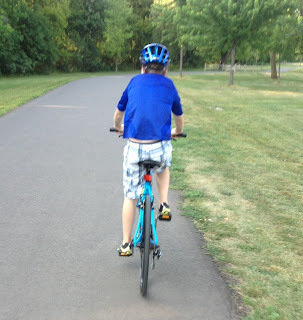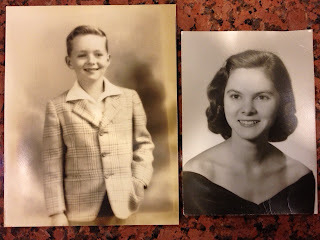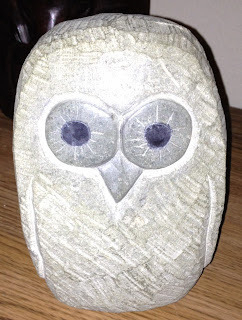Euthyphro
∞
Bicycles, Handguns, and Cameras
Get Off My Hood!
I just read a post on Facebook about a bicyclist in my town who was struck by someone driving a pickup truck. The driver then yelled at the bicyclist to "get the f*** off my hood" and told him to ride on the sidewalk. The driver is obviously misinformed about our laws, as well as about civility.
The bicyclist managed to take a picture of the driver's face and his truck, but not his license plate, which is too bad.
Packing Heat On Two Wheels
The comments under the photo were especially interesting. I'm not sure if he was joking, but the bicyclist (whom I do not know) said that he often bikes with a .45 in his waistband, which dissuades drivers from treating him with hostility. This time he only had his camera, and he wasn't able to shoot pictures fast enough to capture all the evidence the police would need.
I understand his frustration. Last summer, while biking on an empty street five lanes wide, a motorist sped up behind me, swerved into my lane (I was biking along the shoulder) and yelled at me to "Get on the sidewalk!" then sped off. By the time I had my phone out, he was too far away to get a picture of his license plate. He sped off uphill, making it impossible for me to chase him down.
His recklessness and utter selfishness could have maimed or even killed me had I not safely dodged his oncoming car. His cowardice and lack of regard for my life made me livid.
You Better Outrun My Bullet
But I do not see how a gun would have helped me. Yes, perhaps he would have seen a gun in my waistband, but at his speed he very well might not have seen it. And what would I do with it? I'm not going to start squeezing off rounds at a fleeing motorist; to do so would make me a worse criminal than he. Besides, I was in no state to be handling a weapon: my heart was pounding, adrenaline was shooting through my veins. I was angry, and I was feeling that fright that comes when sudden and severe peril suddenly interrupts a calm day.
I don't want my world to be under constant surveillance, but I'm considering getting a GoPro or some other video camera that would run constantly when I bike on the street. I think if more of us did that, it would be a more effective deterrent than a firearm.
We're In This Together
More importantly, carrying a camera rather than a gun says something about community. The gun is about taking personal charge of one's security, and while I applaud the individual responsibility that implies, the camera insists that reckless driving is not my problem but our problem, a problem that we will deal with as a community, through the structures of law that constitute our community. If you harass bicyclists, I will film it, and I will hand the evidence over to the police.
This is what it means to live in a society that respects the rule of law. We don't live in the time of Euthyphro, who needed to enforce the law himself. We live in the age of the District Attorney; and whatever you may say about an individual D.A., the point of a state-appointed prosecutor is just this: she is the embodiment of our belief that to offend against one of us is to offend against all of us. We are in this together.
I don't want to foster hostility between motorists and cyclists; I want to foster mutual respect. The roads are wide enough to share. If we can learn to do so, we'll all wind up reaching good destinations, together.
*****
Update: Here's a link to an article by Jill Callison about the confrontation between the cyclist and the motorist in the Sioux Falls Argus Leader.
*****
Further Update: Here's a link to a bit of good news: the driver has been charged with several misdemeanors. This is good news for bicyclists, and bad news for hotheaded drivers unwilling to share the road with their neighbors.
I just read a post on Facebook about a bicyclist in my town who was struck by someone driving a pickup truck. The driver then yelled at the bicyclist to "get the f*** off my hood" and told him to ride on the sidewalk. The driver is obviously misinformed about our laws, as well as about civility.
The bicyclist managed to take a picture of the driver's face and his truck, but not his license plate, which is too bad.
 |
| My speedy steed. Please do not hit me. |
Packing Heat On Two Wheels
The comments under the photo were especially interesting. I'm not sure if he was joking, but the bicyclist (whom I do not know) said that he often bikes with a .45 in his waistband, which dissuades drivers from treating him with hostility. This time he only had his camera, and he wasn't able to shoot pictures fast enough to capture all the evidence the police would need.
I understand his frustration. Last summer, while biking on an empty street five lanes wide, a motorist sped up behind me, swerved into my lane (I was biking along the shoulder) and yelled at me to "Get on the sidewalk!" then sped off. By the time I had my phone out, he was too far away to get a picture of his license plate. He sped off uphill, making it impossible for me to chase him down.
His recklessness and utter selfishness could have maimed or even killed me had I not safely dodged his oncoming car. His cowardice and lack of regard for my life made me livid.
You Better Outrun My Bullet
But I do not see how a gun would have helped me. Yes, perhaps he would have seen a gun in my waistband, but at his speed he very well might not have seen it. And what would I do with it? I'm not going to start squeezing off rounds at a fleeing motorist; to do so would make me a worse criminal than he. Besides, I was in no state to be handling a weapon: my heart was pounding, adrenaline was shooting through my veins. I was angry, and I was feeling that fright that comes when sudden and severe peril suddenly interrupts a calm day.
I don't want my world to be under constant surveillance, but I'm considering getting a GoPro or some other video camera that would run constantly when I bike on the street. I think if more of us did that, it would be a more effective deterrent than a firearm.
We're In This Together
More importantly, carrying a camera rather than a gun says something about community. The gun is about taking personal charge of one's security, and while I applaud the individual responsibility that implies, the camera insists that reckless driving is not my problem but our problem, a problem that we will deal with as a community, through the structures of law that constitute our community. If you harass bicyclists, I will film it, and I will hand the evidence over to the police.
 |
| We're in this together. Can we share the road? |
I don't want to foster hostility between motorists and cyclists; I want to foster mutual respect. The roads are wide enough to share. If we can learn to do so, we'll all wind up reaching good destinations, together.
*****
Update: Here's a link to an article by Jill Callison about the confrontation between the cyclist and the motorist in the Sioux Falls Argus Leader.
*****
Further Update: Here's a link to a bit of good news: the driver has been charged with several misdemeanors. This is good news for bicyclists, and bad news for hotheaded drivers unwilling to share the road with their neighbors.
∞
A Gift Of A Sponge
My father bundled us into our hats and coats and then into his little red VW and drove us to the Caldor store in Kingston. The first Christmas I can now remember was fast approaching, and he wanted my brother, my sister and me to choose gifts for our mother.
I had no idea how to shop, of course, so my father asked me to think about what my mother liked. The only thing I could think was that I often saw her cleaning things: washing dishes, cleaning floors and windows, doing laundry. Obviously, she must like cleaning quite a lot.
So I decided to buy her a sponge.
My father balked at this, but I insisted. This is what she likes, this is what I want to buy.
Two events that followed have imprinted themselves forever on my memory, have made me forever grateful to my parents.
First, Dad let me buy it. It's not at all what he would have chosen. But he gave me the gift of letting me decide, the gift of the long, slow welcome into responsible adulthood.
Second, mom loved it. Let me clarify that: she loved the gift, and she thanked me warmly and genuinely, smilingly. And so she gave me a gift as well, the gift of teaching me how to receive the offerings of others with grace; the gift of her love that consecrated my poor offering.
Both of them gave me another gift as well, of course: I had no money to buy the sponge, so I used theirs. I took their money and spent it on what they did not need, on a gift that, coming from another person or from me at a different age, would have been offensive. They gave me the gift of ennobling my shabby token into a gift of great worth.
No year of my life has passed in which I have not thought of that kitchen sponge. It reminds me that no act of kindness towards a child is wasted. It reminds me of my parents' love for me, love that I fumblingly attempt to pass on to my children as I seek to give them the difficult gift of autonomy.
And my parents, in that Christmas, gave me hope that the poor offerings of my worship - in which I spend what is not really mine in order to give a gift that is not really needed - might really matter, not because they are intrinsically great, but because of the love and grace with which they might be received, and consecrated.
I had no idea how to shop, of course, so my father asked me to think about what my mother liked. The only thing I could think was that I often saw her cleaning things: washing dishes, cleaning floors and windows, doing laundry. Obviously, she must like cleaning quite a lot.
So I decided to buy her a sponge.
My father balked at this, but I insisted. This is what she likes, this is what I want to buy.
Two events that followed have imprinted themselves forever on my memory, have made me forever grateful to my parents.
 |
| Dad and Mom were young once, too. |
Second, mom loved it. Let me clarify that: she loved the gift, and she thanked me warmly and genuinely, smilingly. And so she gave me a gift as well, the gift of teaching me how to receive the offerings of others with grace; the gift of her love that consecrated my poor offering.
Both of them gave me another gift as well, of course: I had no money to buy the sponge, so I used theirs. I took their money and spent it on what they did not need, on a gift that, coming from another person or from me at a different age, would have been offensive. They gave me the gift of ennobling my shabby token into a gift of great worth.
No year of my life has passed in which I have not thought of that kitchen sponge. It reminds me that no act of kindness towards a child is wasted. It reminds me of my parents' love for me, love that I fumblingly attempt to pass on to my children as I seek to give them the difficult gift of autonomy.
 |
| A gift from my students; it means more to me than words can easily say. |
And my parents, in that Christmas, gave me hope that the poor offerings of my worship - in which I spend what is not really mine in order to give a gift that is not really needed - might really matter, not because they are intrinsically great, but because of the love and grace with which they might be received, and consecrated.